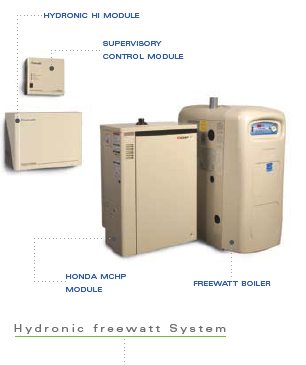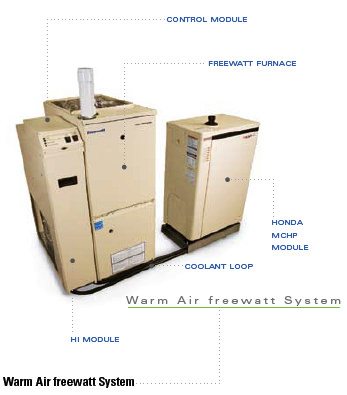 Combined Heat and Power (CHP) systems have practiced in industrial applications for years. They are attractive because they capture the most of the energy that is lost to heat in generating electricity. Now Micro-CHP systems are making their way into domestic applications, especially in areas where homeowners can send excess electricity into the power grid for a credit at a later point.
Combined Heat and Power (CHP) systems have practiced in industrial applications for years. They are attractive because they capture the most of the energy that is lost to heat in generating electricity. Now Micro-CHP systems are making their way into domestic applications, especially in areas where homeowners can send excess electricity into the power grid for a credit at a later point.
One company, freewatt, markets a Micro-CHP system based on a small, specially designed, and super quiet Honda generator combined with an inverter and a high-efficiency Energy Star rated furnace or boiler, depending on the heating system used in the home. The generator runs on either propane or natural gas. While generating the heat for the home, the system also produces 1.2 kW of low-cost, green electricity. According to freewatt, some homeowners can reduce their electricity to zero during cold winter months. The system also provides a low level continuous heat throughout the home, without the surges and cooling that traditional thermostat controlled furnaces have.
The Micro-CHP unit, produced by the Honda Motor Company, uses an internal combustion engine to produce both heat and electric power. This unit is an incredibly quiet (only 47 dBA at 1 meter) long life, small engine-generator that has already been installed in over 50,000 homes in Japan. The engine runs on clean natural gas or propane and can be located in a basement or utility room. This engine produces 1,200 watts of electric power and about 12,000 BTUs per hour of heat for the home. The generator has a catalytic converter that filters the exhaust before it is vented to the outside of the home.
and electric power. This unit is an incredibly quiet (only 47 dBA at 1 meter) long life, small engine-generator that has already been installed in over 50,000 homes in Japan. The engine runs on clean natural gas or propane and can be located in a basement or utility room. This engine produces 1,200 watts of electric power and about 12,000 BTUs per hour of heat for the home. The generator has a catalytic converter that filters the exhaust before it is vented to the outside of the home.
One feature we especially liked for second homes was the internet capabilities available to monitor the freewatt system. Homeowners can monitor their energy savings, adjust thermostat remotely and the system will even alert your dealer with service messages as needed.
Energy efficiency you can feel good about
The environmental benefits are numerous. The freewatt system can produce about 5000 kW of electricity using about 60% less fuel than your electric utility. You’ll also reduce your carbon footprint by about 6,000 pounds of greenhouse gases each year. The National Appraiser’s Institute estimates that a freewatt system can add $5,000 to $20,000 of value to your home for long-term investment benefits.
